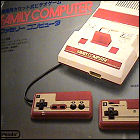 In Japan, Nintendo launches the Famicom (Family Computer) home video game system, with a few games available at the product’s launch, all of which are ports of popular Nintendo arcade games. Within months, major technical problems are reported and faulty consoles are returned, and Nintendo discovers that a design flaw is responsible. All Famicom units are recalled and refurbished at the company’s expense. In two years, the console will be launched in North America as the Nintendo Entertainment System, almost single-handedly reviving the video game industry around the world.
In Japan, Nintendo launches the Famicom (Family Computer) home video game system, with a few games available at the product’s launch, all of which are ports of popular Nintendo arcade games. Within months, major technical problems are reported and faulty consoles are returned, and Nintendo discovers that a design flaw is responsible. All Famicom units are recalled and refurbished at the company’s expense. In two years, the console will be launched in North America as the Nintendo Entertainment System, almost single-handedly reviving the video game industry around the world.
More about NES in Phosphor Dot Fossils
![]() ITV airs the 82nd episode of the anthology series Tales Of The Unexpected. Dick Smothers, Sharon Gless, and Heather Locklear guest star.
ITV airs the 82nd episode of the anthology series Tales Of The Unexpected. Dick Smothers, Sharon Gless, and Heather Locklear guest star.

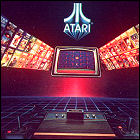 With the video game industry crash taking its toll, and Atari’s financial status in free-fall, CEO Ray Kassar resigns from the company shortly after a disastrous earnings report showing two straight quarters of multi-million dollar losses – the first Warner Communications suffered since the year before it bought Atari and installed Kassar as CEO. Kassar has also drawn fire for accusations that he sold thousands of shares of his Warner stock minutes prior to the fateful December 1982 announcement that heralded the beginning of the industry’s downturn. Kassar is replaced by former Philip Morris marketing VP James Morgan, who has no prior experience in the consumer electronics field; his previous experience has been in tobacco marketing.
With the video game industry crash taking its toll, and Atari’s financial status in free-fall, CEO Ray Kassar resigns from the company shortly after a disastrous earnings report showing two straight quarters of multi-million dollar losses – the first Warner Communications suffered since the year before it bought Atari and installed Kassar as CEO. Kassar has also drawn fire for accusations that he sold thousands of shares of his Warner stock minutes prior to the fateful December 1982 announcement that heralded the beginning of the industry’s downturn. Kassar is replaced by former Philip Morris marketing VP James Morgan, who has no prior experience in the consumer electronics field; his previous experience has been in tobacco marketing. NBC airs the 20th and final episode of James D. Parriott’s time travel series Voyagers!, starring Jon-Erik Hexum and Meeno Peluce. Julia Duffy guest stars as Nellie Bly, and Michael Ensign guests stars as Sir Arthur Conan Doyle.
NBC airs the 20th and final episode of James D. Parriott’s time travel series Voyagers!, starring Jon-Erik Hexum and Meeno Peluce. Julia Duffy guest stars as Nellie Bly, and Michael Ensign guests stars as Sir Arthur Conan Doyle.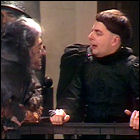
 In Japan, Nintendo launches the Famicom (Family Computer) home video game system, with a few games available at the product’s launch, all of which are ports of popular Nintendo arcade games. Within months, major technical problems are reported and faulty consoles are returned, and Nintendo discovers that a design flaw is responsible. All Famicom units are recalled and refurbished at the company’s expense. In two years, the console will be launched in North America as the Nintendo Entertainment System, almost single-handedly reviving the video game industry around the world.
In Japan, Nintendo launches the Famicom (Family Computer) home video game system, with a few games available at the product’s launch, all of which are ports of popular Nintendo arcade games. Within months, major technical problems are reported and faulty consoles are returned, and Nintendo discovers that a design flaw is responsible. All Famicom units are recalled and refurbished at the company’s expense. In two years, the console will be launched in North America as the Nintendo Entertainment System, almost single-handedly reviving the video game industry around the world.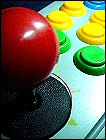 After dismal second-quarter earnings reports lead to weeks of massive sell-offs of Warner Communications and Texas Instruments stock (among many other companies tied into the field of computer and video games), investment firm Prudential-Bache Securities – usually a staunch supporter of tech stocks – kicks the industry crash into high gear with a simple warning: do not buy. Stock prices for video game and computer companies tumble precipitously for the remainder of 1983, driving some of the industry’s longest-lived players out of the business (or out of business altogether). Even relatively stable stocks such as Apple and Coleco take a major hit; computer manufacturers and arcade-only game makers who have made it through the first half of 1983 unscathed find their stock valued at half of what it was worth just weeks before. In many respects this marks the end of the home-grown American video game industry: the next wave of successful products will arrive from Japan, and American software houses will rely on those machines to run their products.
After dismal second-quarter earnings reports lead to weeks of massive sell-offs of Warner Communications and Texas Instruments stock (among many other companies tied into the field of computer and video games), investment firm Prudential-Bache Securities – usually a staunch supporter of tech stocks – kicks the industry crash into high gear with a simple warning: do not buy. Stock prices for video game and computer companies tumble precipitously for the remainder of 1983, driving some of the industry’s longest-lived players out of the business (or out of business altogether). Even relatively stable stocks such as Apple and Coleco take a major hit; computer manufacturers and arcade-only game makers who have made it through the first half of 1983 unscathed find their stock valued at half of what it was worth just weeks before. In many respects this marks the end of the home-grown American video game industry: the next wave of successful products will arrive from Japan, and American software houses will rely on those machines to run their products.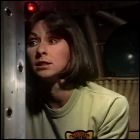 ITV premieres the
ITV premieres the 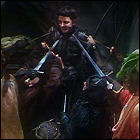
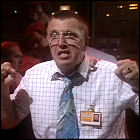 ITV premieres the
ITV premieres the 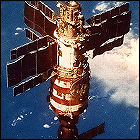 A small object hits one of the windows aboard the Soviet Union’s Salyut 7 space station, leaving a noticeable dent on its exterior layer but not causing enough damage to vent the station’s atmosphere into space (luckily for resident cosmonauts Vladimir Lyakhov and Aleksandr Aleksandrov, who might have to evacuate in their Soyuz T-9 vehicle in such an emergency). Though speculations include a micrometeoroid or wayward debris from a previous space mission, the exact cause of the impact is never confirmed.
A small object hits one of the windows aboard the Soviet Union’s Salyut 7 space station, leaving a noticeable dent on its exterior layer but not causing enough damage to vent the station’s atmosphere into space (luckily for resident cosmonauts Vladimir Lyakhov and Aleksandr Aleksandrov, who might have to evacuate in their Soyuz T-9 vehicle in such an emergency). Though speculations include a micrometeoroid or wayward debris from a previous space mission, the exact cause of the impact is never confirmed.